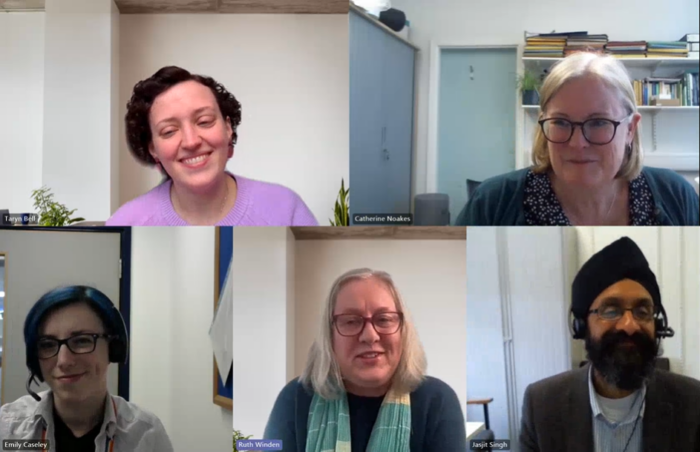Top tips for career conversations (Reflections from Concordat Awareness Month)
Concordat Awareness Month in February gave colleagues an opportunity to find out more about our commitment to supporting the career progression of our research staff through a variety of events.
It closed with an eminent panel discussing the significance, rewards, and challenges of holding career conversations, offering valuable ideas and tips for effective discussions. The panel addressed the needs of both managers seeking guidance on talking with their researchers, and postdoctoral researchers wanting to prepare and benefit from these conversations. Emphasising transparent dialogue and the necessity of creating robust frameworks, the discussion highlighted the importance of creating supportive environments for researchers to explore their career options freely.
Our panel, facilitated by Ruth Winden (Careers with Research Consultant, OD&PL), included:
- Professor Cath Noakes OBE – Professor of Environmental Engineering for Buildings, Pro-Dean Research & Innovation, Faculty of Engineering and Physical Science
- Assoc Professor Jasjit Singh – Pro-Dean International, Faculty of Arts, Humanities and Cultures
- Dr Taryn Bell – Researcher Development Adviser (Career Development), OD&PL
- Dr Emily Caseley – Research Fellow, School of Biomedical Sciences
We extend our heartfelt gratitude to the panel of experts for generously sharing their invaluable insights and experience. Their contributions will undoubtedly inspire many meaningful career conversations.

The following sections provide a compilation of key insights and top tips to help guide your next career conversations.
Top Tips for Research Managers / Principal Investigators (PI)
Start as you mean to go on. Have career conversations early on with your researchers to ensure you can leverage relevant opportunities. For example, if they are interested in policy, allow them to participate in policy and stakeholder engagement activities, helping them to build valuable experience.
Create a culture of openness. Go in with an open mind. Don’t assume each postdoc aspires to have a particular career path in mind, all are individuals with different motivations and aspirations. Be open to supporting and facilitating their individual trajectory.
You’re not expected to be a careers advisor aware of all the opportunities, nor to have all the answers. Colleagues in OD&PL are here to provide additional support and resources.
You don’t always have to give advice. Just listening or asking probing questions can serve as the conduit to help the individual find the right answer.
Embed career development into their postdoctoral role. Encourage your postdocs to take up career development opportunities. The Researcher Development Concordat at Leeds provides researchers with ten days of protected development time. Routinely embedding this time into their workloads (and incorporating this time in your future funding applications) ensures development opportunities don’t get neglected.
Continue the conversation. Research leaders have the power to help their students, postdocs or mentees realise that careers aren’t just something you think about when your contract is up, or you want a new job. Continue to have regular conversations, have an open mind, and be supportive.
Top Tips for Postdoctoral Researchers
Remember, it’s your conversation, your career!
Come to career conversations prepared.
- When arranging your meetings, briefly outline what you want to discuss. This will help the PI prepare, and the discussion is likely to be more fruitful for both parties as a result.
- Reflecting on your ambitions, strengths and values will help you get the most out of conversations.
- Take proactive steps to foster emotional readiness before engaging in career conversations, as these discussions present opportunities for growth and development.
- Allocate time to reflect on the conversation afterwards.
Related News
Focus on Assessment and Feedback
To support the implementation of our curriculum redefined priorities for assessment and feedback, Professor Alice O'Grady (Dean for Student Education: Quality and Standards) is chairing a series of assessment and feedback matters webinars with invited external guest speakers, supported by OD&PL. The way we think about assessment at Leeds is changing. The pandemic has given us an...
Spotlight on assessment and feedback, new resources for staff
Our new resource for staff focussing on student assessment and feedback is now available. It features a series of resources, case studies and articles, which can be used to develop and enhance your academic practice.
Tips for SRDS
Preparation In preparation for your SRDS you may wish to review some of these tips. Reviewers Give your reviewee plenty of time to prepare (advisory - 2 weeks.) Get last year’s SRDS form and give the staff member a copy. Look at the University Strategy document to ensure staff member’s objectives will be aligned with...
